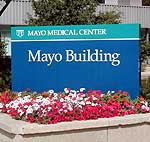By Erin Galbally
Minnesota Public Radio
August 27, 2002
Foreigners have sought medical treatment at the Mayo Clinic in Rochester for nearly 100 years. Over time, patients from the Middle East have emerged as some the clinic's most important clientele. Traditionally, summer brings visitors from Kuwait, the United Arab Emirates, and Saudi Arabia to Rochester for treatment. But since Sept. 11, the number of visitors is down at least 50 percent. That's largely because international visitors face long delays in receiving visas for travel to the U.S. Mayo isn't the only local business missing out.
| |
|
|
|
||
Anwar Haq owns the International Spices grocery store in downtown Rochester. His store is filled with Arabic newspapers, sacks of rice imported from India, and shelves lined with exotic jars of olives and tahini. Haq takes a quick spin around his store.
"This is cumin seed right over here - $1.69. You can buy it at the American market for $3," he says, holding a bag filled with the spice.
Haq is from originally from Pakistan. He opened his business in the early '90s to cater to Rochester's burgeoning Middle Eastern population. In the past, summer has been Haq's high season, thanks to a steady stream of customers in town for treatment at the Mayo Clinic.
Haq says he went into this summer with minimal expectations, because business had dropped so much since Sept. 11. But as summer comes to a close, Haq says business is starting to improve.
But Rochester's main breadwinner, the Mayo Clinic, calls the summer a bust. Mayo is the reason scores of foreigners settle in Rochester in June, July and August.
| |
|
|
|
||
According to clinic officials, Middle Eastern patient numbers are down by more than half. Steve Gudgell oversees Mayo's international activities.
"We aren't going to make our numbers this year and we know that," says Gudgell. "A lot of the reason is out of our control. The number one reason is the visa and international access to the United States and delays are there."
In previous years, foreign patients could obtain visas to the U.S. in a matter of days. Now that process can take months. That's backed by State Department figures which show a major drop in the number of visas issued to Middle Easterners. At least 70 percent fewer visas have been issued, and the INS can't say how many of those travelers decide to come to the U.S. once they get their visa.
Gudgell says patients who criss-cross the globe for medical treatment generally suffer from complicated health problems. He says they tend to get faster visa approval, but their relatives still face long waits.
"They want a family member - wife, spouse, parent, (with them.) With those people not having a medical emergency, their visa screening process is still facing full blown delays, and that's frustrating patients," he explains.
| |
|
|
|
||
Prior to Sept. 11, international medical tourism added roughly $2 billion to the national economy. But now instead of coming to Rochester, Boston or Philadelphia, Middle Eastern patients are headed Europe for their health care needs.
Rochester hotels are also feeling the pinch. Frank Heavlin is a regional vice president for Sunstone Hotels, which owns four hotels in Rochester. That includes the upscale Kahler Hotel, where suites go for as much as $2,500 a night. The Kahler is where the family of Jordan's King Hussein lived while he sought treatment for cancer.
Until this year, high-ranking guests were not unusual. But now Heavlin says due to a drop in Middle Eastern guests, his company is facing at least $1 million in losses.
"We do get what we call large entourages, where they take several suites and guest rooms at the same time - and we have seen none of that business," says Heavlin. "But from talking to people, the primary reason they're not coming is their inability to get visas."
Heavlin will need to explain the loss in business to his company. He says he has little hope that business will rebound this summer. Instead he's focusing on next year.
Mayo's Steve Gudgell echoes that statement. Gudgell says Mayo officials have communicated their concerns over visa delays to the State department.



